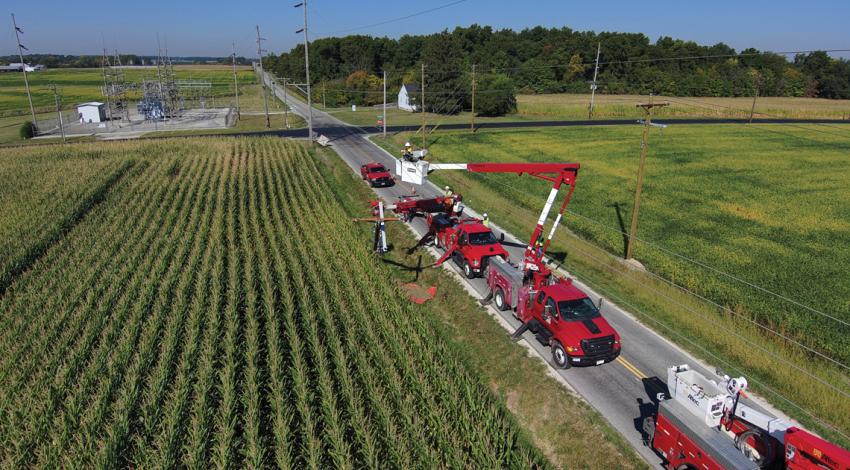Ohioans face some significant choices as they enter the voting booth next month — not the least of which are whom to elect as the next governor and which candidate will best represent the state in the U.S. Senate.
Knowing the importance of electric cooperative voters in the campaigns, the major-party candidates for the two offices took some time recently to answer questions that are crucial to Ohio Cooperative Living readers.
Governor

Mike DeWine, Ohio’s attorney general and a former two-term U.S. senator and four-term congressman, is the Republican candidate, with Jon Husted as his running mate for lieutenant governor. He faces Richard Cordray, the Democratic former attorney general and state treasurer and first director of the federal Consumer Financial Protection Bureau, and his running mate, Betty Sutton.
Q: What will be the issues of highest priority for your administration?
DeWine:
- Help bring more high-paying, 21st-century jobs to all parts of Ohio.
- Improve early childhood education and health services
so kids have the skills they need early in life to succeed. - Implement a 12-point comprehensive action plan to combat
the opioid crisis. - Enact real-world education reform that gets our kids either career-ready or college-ready.
Cordray: Betty’s and my No. 1 priority as governor and lieutenant governor will be putting money back into the pockets of middle-class Ohioans. In order to accomplish that, we will work to keep health care costs low, provide quality workforce training and education programs, and invest in local small businesses.
Betty and I know how important the Medicaid expansion is in covering low-income Ohioans, keeping rural hospitals open, and reducing costs for everyone in the state. That is why we have always supported Medicaid expansion, and will work to bolster and improve the Medicaid program as governor and lieutenant governor.
Another way that Betty and I will work to put money in the pockets of Ohioans is by giving them the tools and education they need to succeed in the ever-evolving 21st-century workplace. We will invest in workforce training so that every Ohioan has the opportunity to unlock their full potential.
Finally, we will empower Ohio’s small businesses in order to create local jobs and bolster local economies. We will also provide better tax incentives, grants, and small-business loans in order to help local entrepreneurs and business owners.
Q: Ohio’s electric cooperatives rely on a diverse set of generation sources. As governor, how closely will your energy policy align with our all-of-the-above approach regarding electric generation?
DeWine: Jon Husted and I believe in an all-of-the-above energy strategy. Ohio must have an energy plan that reflects our diverse industries and the availability of natural resources, including both existing and evolving technologies. Ohio is a regional leader for low-cost energy. Maintaining regionally competitive energy prices is a key component in growing Ohio’s economy and attracting new businesses.
Cordray: Ohio’s energy policy should focus on making energy costs affordable for middle-class families and expanding the sector so that we are creating good-paying jobs with the opportunities and natural resources available — like water, solar, and wind.
That’s why as governor, I’ll pursue an “all-of-the-above” energy policy that takes advantage of Ohio’s great natural resources, while making smart investments in the jobs of the future, in emerging sectors like wind and solar. Through that policy, we can create good-paying jobs for Ohioans in design, construction, and maintenance. Those are good jobs, many of which don’t require a college degree, that can support a person and their family.
But if we’re going to move forward on energy, we need to end a misguided ideological agenda in Columbus that’s keeping the renewable-energy sector from investing in Ohio and creating jobs. We need to lead the way on clean energy and tell companies that Ohio is open for business once again in renewable energy and energy efficiency.
Q: What will you do to help improve the economic vitality of rural communities and improve opportunities for residents of rural areas?
DeWine: Nearly two-thirds of Ohio counties are rural. These communities were hit hard by the recession. People are doing better, but many rural areas, especially in southeast Ohio, have been left behind.
As governor, I will:
- Slow and reverse the opioid epidemic with my 12-point action plan;
- Create and maintain an economic climate that attracts businesses to Ohio and helps existing businesses grow;
- Work with businesses, schools and universities, and local agencies to ensure that people can access training for in-demand jobs; and
- Expand early childhood education opportunities that help children grow and learn and empower families to go to work.
Those efforts will not only improve today’s workforce and economy, but they will also ensure that our state will thrive for future generations.
Cordray: For too long, our rural communities have suffered while Republicans in Columbus turned a blind eye. Betty and I will ensure that rural communities aren’t left behind by investing in infrastructure, restoring funding to local communities, and retaining Medicaid expansion.
Ohio’s infrastructure is crumbling, and nowhere is that more apparent than in our state’s rural areas. We want to fix Ohio’s roads and bridges, repair our water infrastructure, and stretch broadband across the state. These improvements will help to stimulate commerce throughout Ohio and ensure that rural areas have access to the 21st-century economy.
Betty and I will also end state government’s cutbacks on local funds that have left schools underfunded, jails overcrowded, and local infrastructure in ruins. We want to empower change and development on the local level by restoring vital funding to local governments so that they can make the improvements that their communities need.
Finally, we will aid Ohio’s rural communities by retaining Medicaid expansion. If Medicaid expansion were ended or diminished, one of the biggest losers would be rural hospitals. With less people insured and more uncompensated care costs, rural hospitals would begin to close, eliminating good-paying, local jobs and putting the health of rural Ohioans in danger.
Senator

Democratic incumbent Sherrod Brown seeks his third term in the U.S. Senate after seven terms in the U.S. House and two terms as Ohio’s secretary of state. He faces Jim Renacci, a four-term Republican congressman and former president and general manager of the Columbus Destroyers of the Arena Football League.
Q: What will be the most important, pressing issues facing the U.S. Senate in its next term?
Brown: I’m fighting to make sure every single Ohioan has the opportunity to succeed — from the nurse in Cincinnati or the barber in Cleveland to the waitress in New Philadelphia or the business owner in Sandusky. One of the most pressing issues facing our state and country is the need to make sure all workers can earn a living wage, provide for their families, and retire with dignity. Ohioans deserve to see their hard work pay off, and to share in the wealth they create.
At the same time, we must also invest in communities to create new jobs and new opportunities for Ohioans. Another one of my top priorities for my next term in the Senate is pursuing new policies that support U.S. job creation, from renegotiation of trade deals so they work better for Ohioans to tax incentives for companies that keep jobs in the United States.
Fighting the opioid epidemic is another one of my top priorities. I hear from Ohioans on the frontlines of the epidemic every day, and they need Congress to step up and provide the resources they need to make an impact in their communities. In addition to boosting funding for the hardest-hit states like Ohio, I am working with Senator Portman to make it easier for Ohioans battling addiction to get the treatment they need.
Renacci: In 2019, it will be vital to continue pushing for a common-sense, pro-growth agenda that allows all Ohioans to benefit from a thriving American economy. Sustaining long-term economic growth, addressing our debt crisis, and tackling the opioid epidemic are three of our top challenges.
Over the past year, we’ve seen tremendous progress and economic expansion; however, many Ohio families continue to struggle. Unfortunately, Ohio has one of the highest unemployment rates in the nation. As your senator, I will advance a pro-growth, common-sense agenda to advance our economy and to decrease our nation’s debt.
The financial health of our country impacts more than just our wallets. In order for our state to grow and prosper, we need Ohioans, especially young Ohioans, to feel confident there will be opportunities available to them here at home. Bringing more and better-paying jobs to our state will allow Ohioans to have more confidence in the future, which in turn will lead to stronger, more stable communities.
Q: Ohio’s electric cooperatives rely on a diverse set of generation sources. As senator, how closely will your energy policy align with our all-of-the-above approach regarding electric generation?
Brown: We need to support innovation across a wide range of energy sources for both our economy and electric cooperatives. That is why I’ve worked to ensure that cooperatives have access to low-interest loans through the United States Department of Agriculture, and why I’ve supported efforts at the Department of Energy to accelerate the development of the next generation of coal-based energy production that would support jobs while ensuring cleaner air. I’ve also fought for policies to reduce the cost of renewable energy and spur the clean energy economy of tomorrow.
Renacci: I support an all-of-the-above approach to energy that encompasses the robust energy resources located here at home, including natural gas, clean coal, American-made oil, as well as alternative energy sources such as wind, solar, hydropower, and nuclear.
Ohio is a leading energy producer, with robust supplies of both natural gas and coal. In Washington, I have fought to roll back burdensome energy regulations and bring more energy sector jobs to the Buckeye State. Supporting all forms of energy production here at home not only creates more good-paying jobs — it helps to keep energy costs low for Ohio families. As your senator, I will continue working with my colleagues on both sides of the aisle on a comprehensive energy plan that supports our economy in an environmentally responsible way.
This Congress, I am cosponsoring H.R. 1090, the Technologies for Energy Security Act of 2017. The legislation would extend and modify the tax credits for residential energy-efficient property and investments in energy property. The bill would also extend tax credits for investments in energy properties, including renewable energy such as solar, wind, and thermal energy construction.
Furthermore, I staunchly opposed President Obama’s Clean Power Plan in 2015 and voted for legislation to prevent it from going into effect. Due to the negative impact the plan would have had on the state of Ohio, I believe the Supreme Court acted wisely by issuing a stay on its implementation.
Q: What are the biggest challenges facing energy production in the U.S. and what are your plans to address them?
Brown: Ohio has been at the forefront of natural gas production, with the industry creating jobs and improving livelihoods across the state — and it’s important that we make sure that we’re also at the forefront of safe and responsible natural gas production. Ohio communities can have both the economic benefits of natural gas production and a healthy environment in which to raise their families. We have to keep talking to communities and industry leaders as we grapple with new forms of energy and innovate. As our state’s oldest power plants retire, it’s important that we ensure that Ohioans have access to the low-cost, affordable power that has made our state a great place to live and do business in.
Renacci: The United States’ dependence on foreign sources of energy is one of our greatest national security concerns. We cannot afford to halt or discourage domestic exploration and development of our energy resources. Consequently, it is critical to implement policies that support our economic and security interests.
Additionally, Waters of the U.S. is another important issue that needs to be addressed. In Congress, I voted for numerous bills to prevent the WOTUS rule from taking effect, to prevent expanded federal oversight and cost increases for co-ops to build and maintain power lines. The Trump Administration is actively working on rules to fully repeal the rule and to implement rules pre-2015.








